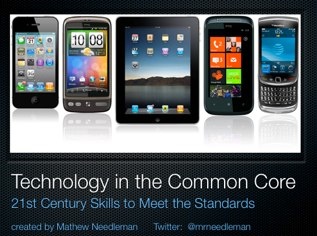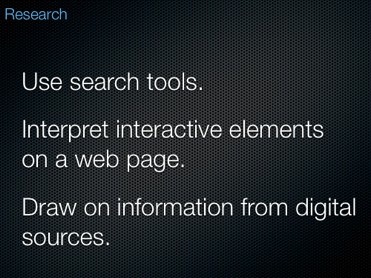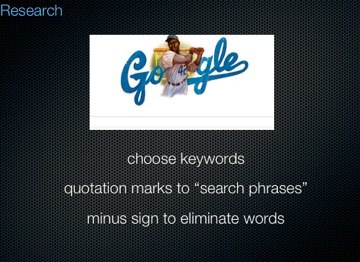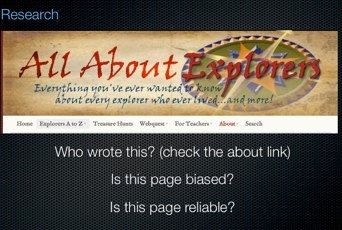 As per the Common Core State Standards students must incorporate digital research in their work. I interpret this to mean that students need a twenty-first century version of book sense. We used to teach students how to find books in a library, how to determine who the author and illustrator is, and where to find copyright information. We now need to teach them how to determine keywords, know how to search, be able to determine who created a particular web page and evaluate a page for bias and reliability.
As per the Common Core State Standards students must incorporate digital research in their work. I interpret this to mean that students need a twenty-first century version of book sense. We used to teach students how to find books in a library, how to determine who the author and illustrator is, and where to find copyright information. We now need to teach them how to determine keywords, know how to search, be able to determine who created a particular web page and evaluate a page for bias and reliability.
How do you do this and what does it look like in a classroom?
Let me be clear, I’m a fan of digital libraries (LAUSD teachers should check out the LAUSD Digital Library). However, in addition to putting expensive high quality pre-vetted resources in front of students we also need to be teaching them how to choose keywords and use Google like a pro.
Beginning in kindergarten I would be modeling how to pick keywords before entering them in the Google search box and finding results. For example, let’s say you’re researching where an octopus lives. Say to students,
“I’m looking for information on where the octopus lives. What words should I search for?”
With your help, students should come up with something like “octopus home” or “octopus habitat” depending how much academic language you’ve seeded.
This two minute step would go a long way toward building effective researchers.
Sharon Sutton at the UCLA lab school has compiled and created some resources to help. Scroll down to the Information Literacy Worksheets, in particular the keywords and synonyms one which asks students to list keywords and synonyms for a research question.
Familiarize yourself with the Google Cheat sheet.
In particular, know that using quotes allows you to search for a particular name or phrase e.g. “Mathew Needleman” gives you only people with my first and last name rather than any page with both my first and last name, possibly disconnected on the page.
Also know that using the minus sign “-” eliminates results. For example, when searching for information about the band, The Eagles, you might search “eagles -football” (eliminating results about the football team). In this example, you will likely need to add keywords to specify information specific about the band and not the bird.
Students should always check for an “about this page” link. If there isn’t one, move on to another site. I’m a fan of the site All About Explorers, it’s created by teachers and gives absolutely false information about famous explorers. Will students catch the errors or will they report that Columbus was born in Australia? Students always need to triangulate the data, find information from multiple sources to eliminate inconsistencies and gain depth.
Have any tips to add? Post them below.



Finding the source of the website information is challenging, but important. We used to teach children to look at multiple book sources as a one means to verify information. If one source seemed out of the loop it was wise to research it before counting it as accurate. Today so many sites merely copy and paste information that inaccurate information can appear in multiple sites making it appear as if there are multiple resouces supporting the information.
We have to inform ourselves and parents and then teach children how to deal with this new reality.
Great tips! I will definitely be using your keyword tips in future library orientations.
Thank you so much for these tips! I am studying elementary education at the University of South Alabama. Reading articles like this shows my role as a teacher and how it has changed. This give me a great insight on what I should prepare my students for!
My name is Rebecca Stuart. I’m a elementary education major at University of South Alabama. First off thanks so much for a the awesome resources! I think I have bookmarked everything on this blog! I have learned some new things about searching on Google that I never knew before. It’s so important for students to be taught very early on how to navigate the internet. Knowing how to use it properly will save them time by not having to mindlessly search for information. Thanks so much for taking time to share this information.
I really think this information is valuable for teaching Common Core. My third grade students have used search bars at home, but when it came to finding information on a research topic, my students consistently hit a wall. When my students work on more collaborative projects using technology, they should be well equipped with tools that will aid in their learning. Many of our students haven’t had any computer training in school, they usually learn by trial and error, or by watching someone else. If we incorporate more computer skills within our lessons, the transition to Common Core won’t be such a shock to our students.
Excellent information, thank you. Embedded in your suggestions is a call for developing habits of slowing down, checking and reflecting with all student research; i.e., applying “mindfulness” practices to research.